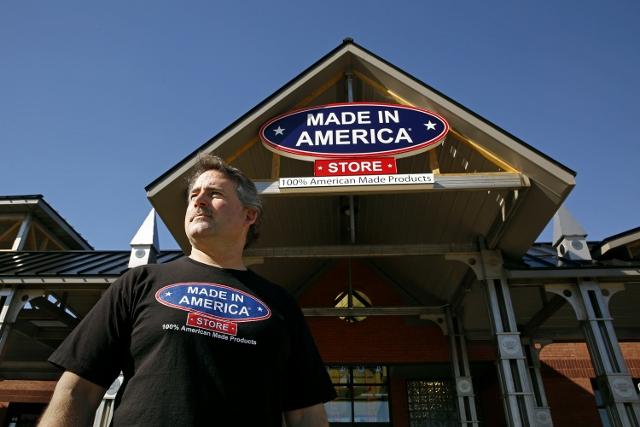It’s hard to be Made in America
Mark Andol, owner and creator of the “Made in America” store located in Elma, New York, is photographed outside the store on March 2, 2017. He opened the store with only 50 products, which were 100% made in America. He is now up to over 7,000 products. (Carolyn Cole/Los Angeles Times/TNS)
March 16, 2017
ELMA, N.Y. — When you stroll the aisles of the Made in America Store, you might notice a conspicuous absence. There is not a single item for sale that requires a battery or a plug. That is because no electronics meet the strict guidelines of an emporium that stocks only products 100 percent made in America.
Still, American-made goods abound — socks and hiking boots, plastic lawn furniture, flags and decals, beer and barbecue sauce, mops and sponges. Toilet paper.
There are three aisles of toys, non-electronic, that veer toward the nostalgic: playing cards, horseshoes, marbles and jacks, boomerangs, Slinkies, perhaps their best-selling item. Checkers and Chinese checkers. (Not the kind made in China.)
The Made in America Store is the brainchild of Mark Andol, 50, an energetic, mile-a-minute talker with silver-tinged, waved-back hair and a wispy mustache.
Andol, the third generation of a Greek immigrant family, was raised on American manufacturing. His father was an ironworker employed at the Ford stamping plant in nearby Buffalo and his mother made xylophone keys for a subcontractor of Fisher-Price, the toy company headquartered in nearby East Aurora.
Andol was frustrated that his welding company, which made metal parts for industry, kept losing contracts to cheaper Chinese competitors. So on a whim, in 2010, he rented a vacant automobile dealership to showcase American products.
“Sure, Mark. The world is fully of crazy people. Go for it,” Andol recalls he was told.
Filling the cavernous building proved more difficult than Andol imagined. At first he carried only 50 products. He had set a standard higher than the Federal Trade Commission, requiring that the products be 100 percent U.S. made “right down to the glue in the packaging.”
Andol was familiar with the certification procedures because he sometimes bid on military contracts, which give preference to U.S. suppliers under a 1941 law called the Berry amendment. He would pore over binders with letters certifying the origins of the components only to be crushed when he had to dump a product that did not make the cut.
“I was so excited to find tea from the United States because I’m a tea drinker, but then I found out the bags were made in Japan and I had to kick it out of the store,” he said.
In homage to his mother’s past making xylophone keys, Andol badly wanted to sell toys from Fisher-Price, which has its headquarters just two miles away.
“They used to have model builders, toy makers, engineers working here, but now they are all gone and only the corporate headquarters is here,” Andol said. “I couldn’t find one Fisher-Price toy completely made in America.”
Other retailers are trying an all-American approach, but it is a constant struggle. Today, Andol boasts that he stocks 7,000 items, although admittedly the numbers get a boost from some products that are essentially the same but come in different sizes or colors. He has opened several branch stores and sells online.
Shoppers in search of a specific item would be advised to head to Wal-Mart. But the novelty of shopping American is enough of an adventure that the Made in America flagship attracts more than 600 tour buses annually.
The store is decked out in an American theme, the walls covered with large completely American-made American flags. (The U.S. imports about $4 million in American flags from China each year.) T-shirts are plastered with the store’s slogan, “Because China is a long drive to work!”
For all the anti-China rhetoric, some of the best customers are Chinese tourists.
“The Chinese go ballistic buying stuff in there because it is made in America, not made in China,” said Eric Bateman, a tour bus operator from Conrad, Iowa, who brings tourists on their way to Niagara Falls. “Mark sells these great, simple things. You can buy a can opener and put it in the dishwasher and it doesn’t rust.”








